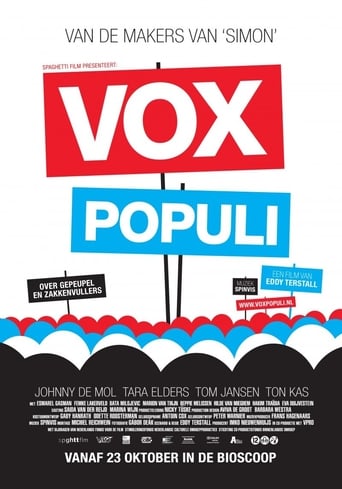Emil Bakkum
The film Vox Populi explores the rise of anti-immigration parties in Europe, in this particular case those in the Netherlands. The aversion against migrants is somewhat alien to the Dutch history, where for instance the French Huguenots and the Jewish community had brought an acknowledged positive stimulus to the nation. On the other hand an unlimited migration must of course lead to an unsustainable situation. In the Netherlands this clash of realities has in the past decade led to two political murders, that shook our society. It is not surprising, that film maker Eddy Terstall, who had previously produced the fairly successful film Simon, decided to devote a film to the subject. In fact he is especially apt to do this project, since he is also politically engaged in the center-left, and thus is an insider with respect to the political culture. The result of his efforts is a spectacle, that is witty, lighthearted and doesn't contain a single dull moment. The main character is Jos, the leader of a party of left-wing liberals (the Red-Greens, an obvious persiflage of the existing Green Left Party). One day his daughter, who is an actress, assists in a role play for the army, and falls in love with an officer (Sjef) from the military police. Sjef stems from a working class family of the Archie Bunker type. When Jos gets acquainted with the family of Sjef, he is somehow impressed by the prejudiced and outspoken ideas of the family, especially about migrants. He starts to use their opinions in his own parliamentary speeches and comments, and as a result shoots up in the opinion polls. Terstall clearly enjoys to bring ridicule on this sudden change of tone, and does this with humor. Eventually a fundamental cleric issues a video message, in which a fatwa (death sentence) is pronounced on Jos. Even this incident is treated lightly by Terstall. Suddenly Jos becomes filled with disgust at what he sees as the unwarranted complaints by the spoiled Dutch people. He refuses to further voice their worries, and emigrates to the sunny former Yugoslavia. In this emigration he is joined by the family of Sjef, who in the midst of migrants no longer feel at home in their own neighborhood. In addition to a respectable casting Terstall managed to include guest appearances of nearly all the well-known hosts of Dutch political talk shows on TV. It is a wink at the often decisive role of the media in promoting the ideas of anti-migration parties. In addition the film portrays the covert racism among the politicians themselves. It also makes fun of the sexual escapades of leading politicians, who lack the nuptial commitment of the common people. It seems that the Dutch film industry has a special talent for this kind of comedies, where anti-social and a frivolous behavior are mixed and the subject of persiflage (see also the famous series of the Flodder family). In this aspect we have a certain congeniality with the British. In conclusion, Vox populi is an enjoyable film that accurately observes and portrays present-day politics, and therefore deserves a broad audience. However the warning is in place, that due to the humorous approach the explanations or solutions for a very real problem are barely addressed. In this respect the closing appeal for tolerance seems a bit cheap.
dfes0
A somewhat chaotic and not too believable story of an imaginary Dutch politician who is caught in the turmoil of current (2008 - 2010) Dutch politics. Neither fully entertaining nor completely moralistic, but with everything added up still enjoyable, so I rate it 6 out of 10 stars.The film starts in typical Eddy Terstall style with rapid switching between characters and equally rapid and witty dialog. Later it slows down and focuses on the main character, Jos Franssen, head of an imaginary left-wing Dutch political party who is heavily influenced by the family of his son-in-law and lurches to the political right, to the horror of his fellow party members. Terstall mixes politics and personal life, like a real politician would experience it, though he seems to want to try to hit as many themes as possible in the limited time that the film allows. Too much is happening and the Franssen character is too much of a wind-vane to be believable, but it is a nice kaleidoscope of current political sentiments. At the end the director tops it off with a clear (and commendable, in my view) political statement that to me is a bit forced and detached from the rest of the film, though some may say otherwise.This film portrays Dutch politics, especially the current situation. It will mostly appeal to Dutch viewers, also because the appearances of numerous well-known Dutch journalists and entertainers, who give the film a very real feel.
